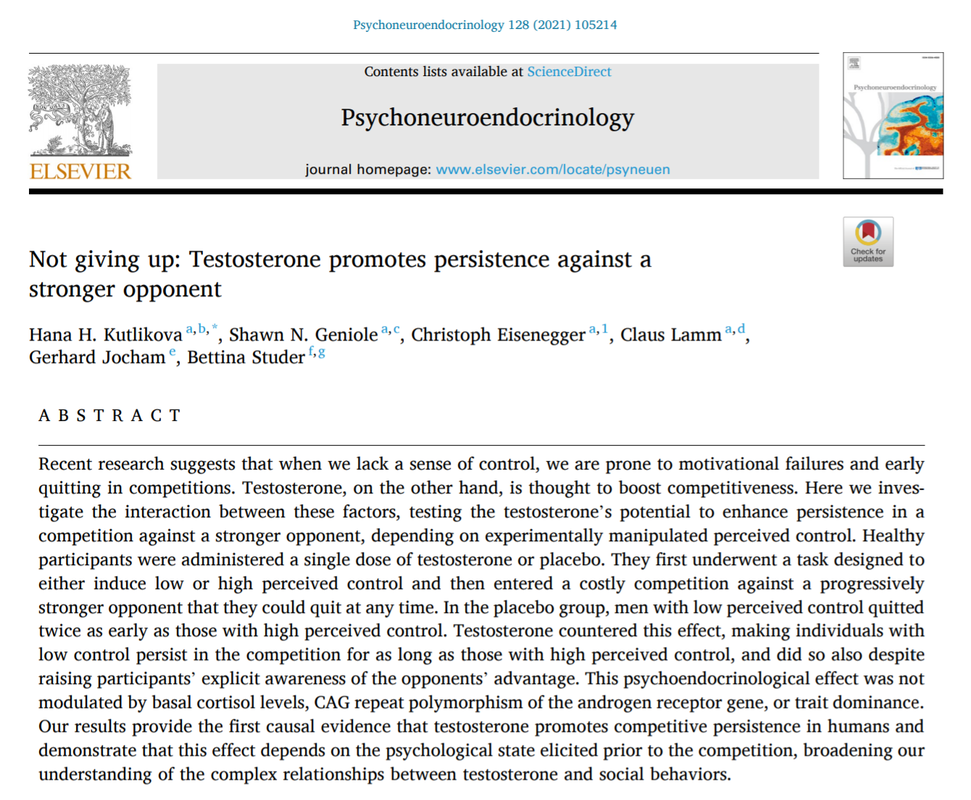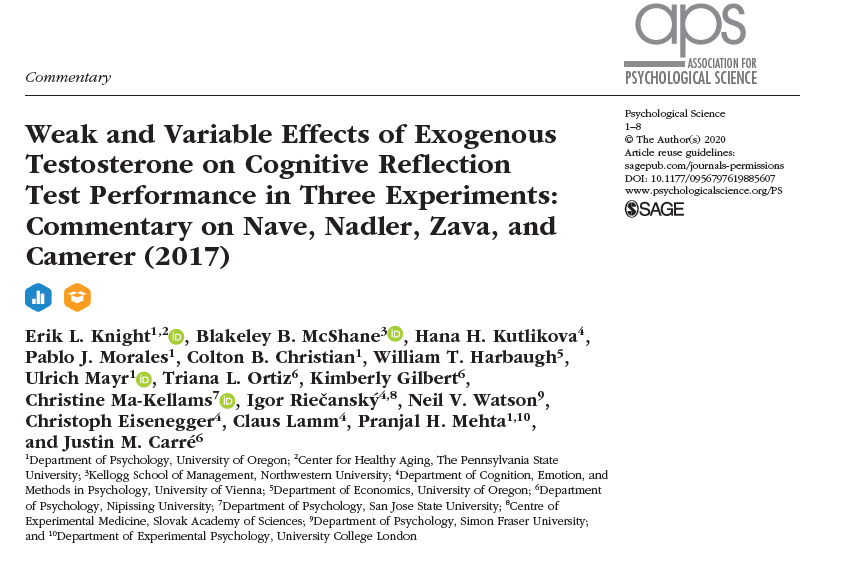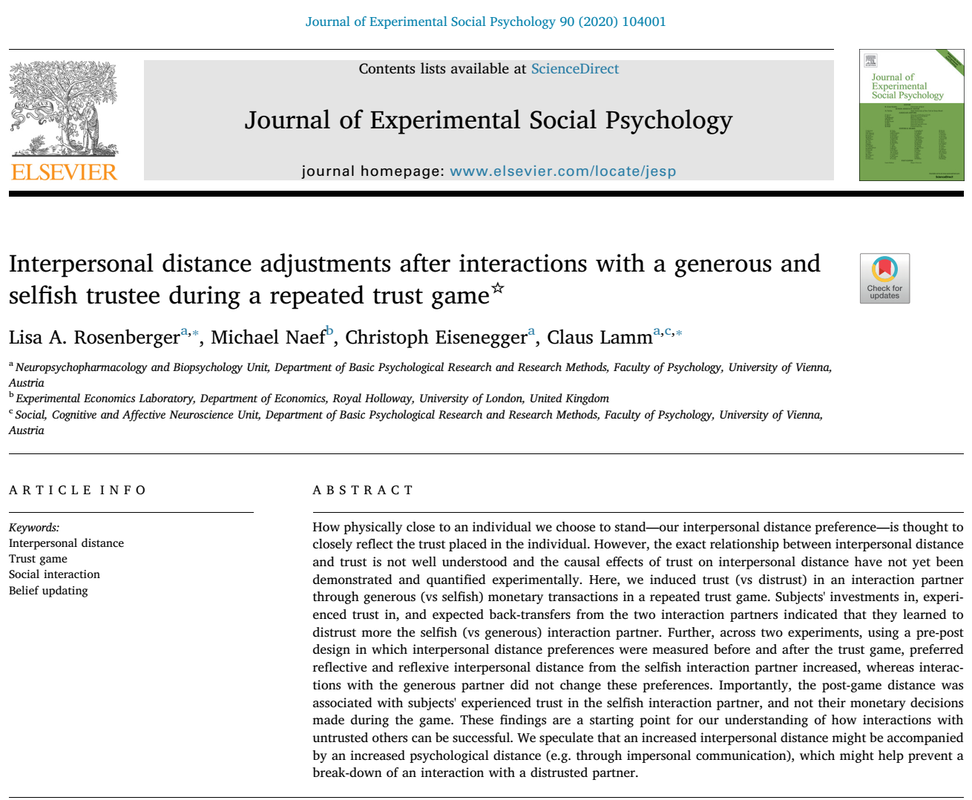|
Together with the researchers from Nipissing University and University of Oregon, we examined the effects of exogenous testosterone on cognitive reflection test across three samples.
https://journals.sagepub.com/doi/10.1177/0956797619885607 The effects of testosterone on the physiological response to social and somatic stressors
Abstract Higher testosterone levels in males have previously been linked to decreased stress reactivity, but in other cases, testosterone has been reported to increase the stress response. We addressed these inconsistencies in a placebo-controlled single-dose testosterone administration study, in which 120 male participants were randomly assigned to undergo a cold-pressor test (CPT, a non-social somatic stressor), a socially evaluated cold-pressor test (SECPT, a social-somatic stressor), or a lukewarm water test (LWT, a non-stressful control condition). Throughout the experiment, blood pressure and interbeat intervals were measured continuously, and saliva samples for hormonal analyses were taken repeatedly at predefined time points. When comparing the groups treated with placebo, the SECPT elicited a larger increase in the systolic blood pressure than CPT, in agreement with previous studies. However, testosterone administration altered this pattern. Compared to placebo, testosterone increased systolic blood pressure during the CPT, whereas the opposite effect was found during the SECPT. Cortisol reactivity was not affected by testosterone administration. The CAG repeat polymorphism of the androgen receptor gene was unrelated to the effects of testosterone on the stress response, but it was correlated with blood pressure across the whole sample. Our findings demonstrate that testosterone’s effects on the stress response are dependent on the social context. Testosterone’s ability to flexibly influence the response to stressors may be an important mechanism through which the hormone promotes adaptive behavior. Our results are also in line with research showing that testosterone decreases social anxiety and suggest it may help to modulate the effects of stress in socially challenging situations. Kutlikova, H. H., Durdiaková, J. B., Wagner, B., Vlček, M., Eisenegger, C., Lamm, C., & Riečanský, I. (2020). The effects of testosterone on the physiological response to social and somatic stressors. Psychoneuroendocrinology, 117, 104693. https://doi.org/10.1016/j.psyneuen.2020.104693 Full text now available here: https://authors.elsevier.com/c/1b2zu15hUdQbT8 Abstract
Testosterone is associated with status-seeking behaviors such as competition, which may depend on whether one wins or loses status, but also on the stability of one’s status. We examined (1) to what extent testosterone administration affects competition behavior in repeated social contests in men with high or low rank, and (2), whether this relationship is moderated by hierarchy stability, as predicted by the status instability hypothesis. Using a real effort-based design in healthy male participants (N = 173 males), we first found that testosterone (vs. placebo) increased motivation to compete for status, but only in individuals with an unstable low status. A second part of the experiment, tailored to directly compare stable with unstable hierarchies, indicated that exogenous testosterone again increased competitive motivation in individuals with a low unstable status, but decreased competition behavior in men with low stable status. Additionally, exogenous testosterone increased motivation in those with a stable high status. Further analysis suggested that these effects were moderated by individuals’ trait dominance, and genetic differences assessed by the androgen receptor (CAG-repeat) and dopamine transporter (DAT1) polymorphisms. Our study provides evidence that testosterone specifically boosts status-related motivation when there is an opportunity to improve one’s social status. The findings contribute to our understanding of testosterone’s causal role in status-seeking motivation in competition behavior, and indicate that testosterone adaptively increases our drive for high status in a context-dependent manner. We discuss potential neurobiological pathways through which testosterone may attain these effects on behavior. Losecaat Vermeer, A.B., Krol, I., Gausterer, C., Wagner, B., Eisenegger, C., & Lamm, C. (2020). Exogenous testosterone increases status-seeking motivation in men with unstable low social status. Psychoneuroendocrinology, 113, 104552. doi: 10.1016/j.psyneuen.2019.104552 (pdf) Lisa, together with Jack van Honk, Michael Naef and other colleagues showed that the basolateral amygdala is indeed useful when learning to trust other people.Rosenberger, L.A., Pfabigan, D., Lehner, B., Keckeis, K., Seidel, E.-M., Eisenegger, C., & Lamm, C. (2019). Fairness norm violations in anti-social psychopathic offenders in a repeated trust game. Translational Psychiatry, in press.
The full text (Open Access) will be available soon! Dear friends and colleagues,
We are proud to announce a symposium in honour of Christoph Eisenegger, titled "THE NEUROBIOLOGICAL BASIS OF HUMAN SOCIAL BEHAVIOR". The symposium will take place on MARCH 25TH 2020 at the University of Vienna from 9 am and will finish with an evening reception. The aim of the symposium is to celebrate the work and achievements of the late Christoph Eisenegger, and the Neuropsychopharmacology & Biopsychology Unit. The symposium will showcase the fruition of his work with the junior scientists of his lab, and in a variety of projects with his national and international collaborators. We will be very happy to welcome you to Vienna, and to commemorate this great scientist and person! Confirmed speakers: Jean-Claude Dreher (Cognitive Neuroscience Center, FR): Influence of testosterone on reward processing and retaliation-related brain activity Shawn Geniole (Nipissing University, CA; University of Vienna, AT): Testosterone reduces the threat premium in competitive resource divisions Jack van Honk (Utrecht University, NL, University of Cape Town, SA):The role of the human basolateral amygdala in social decision-making Michael Naef (University of London, GB): TBA Boris Quednow (University of Zurich, CH): Acute and chronic drug effects on social decision-making Giorgia Silani (University of Vienna, AT): Wanting and liking of social and non-social rewards: The role of dopamine and opioids Bettina Studer (St Mauritius Therapieklinik Meerbusch; Heinrich Heine University Düsseldorf, DE): TBA Yin Wu (Nanjing University, CN): Single dose testosterone administration increases social discounting in healthy males More information, including the preliminary program and how to register (participation will be free of charge), will be announced on https://nbu2020.univie.ac.at. |

Commemoration of Christoph Eisenegger (Feb 27, 2017)
On February 27th 2017, five years ago, our dear friend, colleague, and mentor Christoph “Chris” Eisenegger has passed away.
Chris was an exceptionally talented junior group leader whose research has focused on the neuropharmacology of social behaviour. He has made seminal contributions in this domain, and his ideas and experimental work have had a large impact on the field and on the scientific research conducted by his group and collaborators.
Chris has been a member of the Faculty of Psychology from 2012, first as a postdoctoral fellow in the SCAN-Unit of Claus Lamm, and later as a junior group leader supported by the Vienna Science and Technology Fund and the University of Vienna. In this position, he combined all threads of his previous scientific work into an innovative and multidisciplinary research program, that spanned across the fields of behavioural economics, psychopharmacology, computational modelling, and genetics. Through his enthusiastic approach to science, he brought together a network of national and international collaborators, who continue to work together to this day. His scientific spirit and ideas are thus living on. What he has seeded has, with the ongoing commitment of his research group and collaborators, resulted in novel insights across several research areas (see www.nbu-vienna.com/publications.html for continuously updated information).
He is missed not only for his scientific impact, but also for his kind and engaging personality. Chris was an incredibly supportive supervisor, always eager to ignite others with his spark and keen eye for genuinely interesting and ground-breaking science - and sometimes rather crazy, but ultimately always intriguing research ideas.
His passing has left a huge gap at the Faculty of Psychology, both in terms of content and methodological expertise, but also in terms of his personality and his excellent fit into our dynamically developing academic environment.
Chris, we dearly miss you, and you will always play an important part in our hearts, brains, and scientific activities.
On February 27th 2017, five years ago, our dear friend, colleague, and mentor Christoph “Chris” Eisenegger has passed away.
Chris was an exceptionally talented junior group leader whose research has focused on the neuropharmacology of social behaviour. He has made seminal contributions in this domain, and his ideas and experimental work have had a large impact on the field and on the scientific research conducted by his group and collaborators.
Chris has been a member of the Faculty of Psychology from 2012, first as a postdoctoral fellow in the SCAN-Unit of Claus Lamm, and later as a junior group leader supported by the Vienna Science and Technology Fund and the University of Vienna. In this position, he combined all threads of his previous scientific work into an innovative and multidisciplinary research program, that spanned across the fields of behavioural economics, psychopharmacology, computational modelling, and genetics. Through his enthusiastic approach to science, he brought together a network of national and international collaborators, who continue to work together to this day. His scientific spirit and ideas are thus living on. What he has seeded has, with the ongoing commitment of his research group and collaborators, resulted in novel insights across several research areas (see www.nbu-vienna.com/publications.html for continuously updated information).
He is missed not only for his scientific impact, but also for his kind and engaging personality. Chris was an incredibly supportive supervisor, always eager to ignite others with his spark and keen eye for genuinely interesting and ground-breaking science - and sometimes rather crazy, but ultimately always intriguing research ideas.
His passing has left a huge gap at the Faculty of Psychology, both in terms of content and methodological expertise, but also in terms of his personality and his excellent fit into our dynamically developing academic environment.
Chris, we dearly miss you, and you will always play an important part in our hearts, brains, and scientific activities.
|
|
Welcome to the
Neuropsychopharmacology & Biopsychology Unit (NBU)

The NBU is an interdisciplinary research group of neuroscientists with backgrounds in economics, psychology, neurobiology and psychopharmacology. We work at the Department of Cognition, Emotion, and Methods in Psychology at the Faculty of Psychology of the University of Vienna. Our group seeks to improve the understanding of the neurobiological basis of human social behavior. A major research focus of the group lies in the neurochemical underpinnings of human social decision making. The group receives financial support from the Vienna Science and Technology Fund (WWTF). |
|
Proudly powered by Weebly


